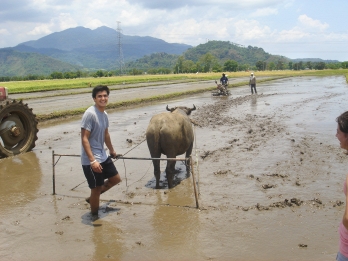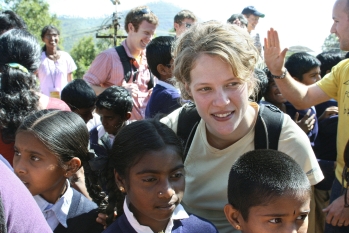COVER STORY
Cornell's global citizens roll up their sleeves and tackle real-world problems

Nick Strutt 08 and a water buffalo in the Philippines, preparing the land for the transplanting of rice seedlings. Strutt, a plant science major, participated in the Rice: Research to Production course at the International Rice Research Institute. See larger image
"I think it's crucial as our world becomes more and more globalized to provide cross-cultural perspectives," Wang says.
The humanities at Cornell also supports important international work. The Walter LeFeber Graduate Research Assistance Fund, for example, supported Tamara Loos, associate professor of history, working with history graduate student Samson Lim, in indexing sources from the national archives in Bangkok to examine the social history of violence in Thailand.
Intercultural understanding motivates the work of Jumay Chu, as well. As a senior lecturer in the Department of Theatre, Film and Dance, Chu is studying dance companies in China to examine how Western ideas of modernity are influencing Chinese culture. Such work helps "dancers and audiences both in China and in America be active and trusting as partners rather than defensively self-conscious about their differences," says Chu.

During a trip to India, Neele Reimann-Philipp 09, center, and other Cornell students mingle with children at a village school outside Ooty in south India. See larger image
Also in China and in the humanities, a new partnership with East China Normal University (ECNU) created the new Cornell-ECNU Center for Cross-Cultural Studies last year as part of the growing Cornell-China Humanities Institute Initiative, which will include partnerships with two additional universities in China.
However, it is the most desperate needs of the developing world, from food to medical care to clean water, that occupy most of the research and education of Cornellians abroad. Perhaps the grandfather of all such Cornell courses is a 41-year-old class in international agriculture and rural development that culminates with a three-week field trip to south India where Indian and Cornell students work together on infrastructure and research projects.
The experience helps make students and faculty "globally relevant," says plant breeding professor K.V. Raman, associate director of international programs in CALS. "[These] Cornell students can now talk about international experience," and faculty members return to Ithaca with "quality lesson plans they can use" and new collaborations with Indian researchers.